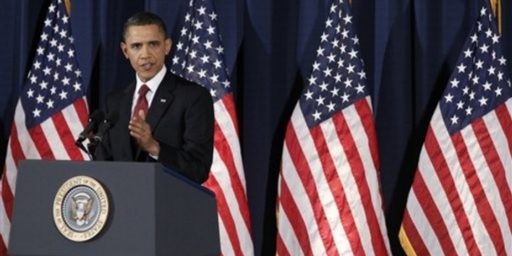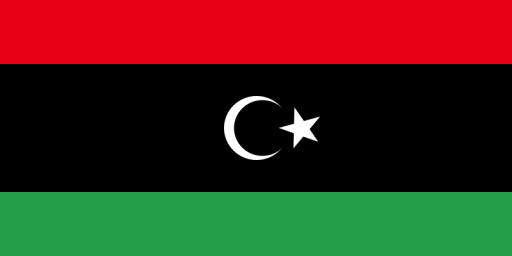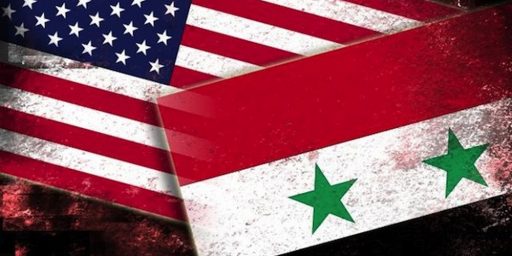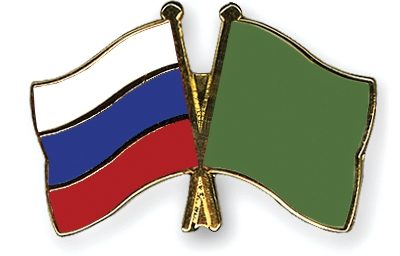LIBYA WMD ANALYSIS
Robin Wright and Glenn Kessler analyze last night’s big announcement:
Libya’s stunning decision yesterday to surrender its weapons of mass destruction followed two decades of international isolation and some of the world’s most punishing economic sanctions. In the end, Libyan leader Col. Moammar Gaddafi was under so much pressure that he was forced to seek an end to the economic and political isolation threatening his government — and his own survival, according to U.S. and British officials and outside experts.
***
“What forced Gaddafi to act was a combination of things — U.N. sanctions after the Lockerbie bombing, his international isolation after the Soviet Union’s collapse . . . and internal economic problems that led to domestic unrest by Islamists and forces within the military,” said Ray Takeyh, a Libya expert at the National Defense University.
Whether by coincidence or fear that Libya might be targeted, Gaddafi’s envoys approached Britain on the eve of the Iraq war to discuss a deal, U.S. officials said.
“The invasion of Iraq sent a strong message to governments around the world that if the United States feels threatened by weapons of mass destruction, we are prepared to act against regimes not prepared to change their behavior,” said a senior State Department official who requested anonymity
. I’m not a big believer in coincidences, especially in international politics. That Gaddafy, who has been a thorn in our side since the Reagan administration (back when he was Khaddafy) picked a moment when the U.S. was about to launch the first campaign in President Bush’s newly announced policy of preemptive action to start these talks is more than a bit convenient.
In a strange reversal of status, Libya is now being touted by the United States and Britain as the new example of how to succeed in ridding a nation of nuclear, chemical and biological weapons and long-range missiles. It provides the model, they said, for how to move forward with Iran, North Korea, Syria and potentially others.
“Leaders who abandon the pursuit of chemical, biological and nuclear weapons and the means to deliver them will find an open path to better relations with the United States and other free nations,” President Bush said in his surprise announcement. “When leaders make the wise and responsible choice, when they renounce terror and weapons of mass destruction, as Colonel Gaddafi has now done, they serve the interest of their own people, and they add to the security of all nations.”
Reflecting the dramatic shift, Gaddafi, in a statement carried by the official Jana news agency, said Libya’s “wise decision” showed his country “plays an international role in building a world free of weapons of mass destruction and all sorts of terrorism.” Another senior official in Libya went as far as to demand that all countries in the Middle East and Africa eliminate equipment, products and programs involved in producing weapons of mass destruction.
Although the United States has exerted the most pressure and imposed the most punitive actions against Libya, Britain took the lead in the initial negotiations. The two nations divided the roles of good cop and bad cop, U.S. and British officials said. All the negotiations were in London and involved a Libyan diplomat in Europe and Libyan intelligence agents.
Despite Libya’s long history of prevarication and procrastination, Tripoli has provided so much access to facilities and so much specific data on its programs that Bush and Blair agreed they had confidence that Gaddafi was sincere.
I’m hopeful that we can quickly get the inspection regimes in place and reintegrate Libya into the international community. This would indeed create a stark contrast with Saddam’s decision: You can do this the easy way. . . or the hard way.
This also gives lie to a talking point used by many of the opponents of the war: That it diverted attention away from the war on terrorism. The notion that we couldn’t simultaneously fight a war against Saddam Hussein, hunt down terrorists, and conduct international diplomacy always struck me as odd. As this agreement demonstrates, it is indeed possible to walk and chew gum at the same time.






The Bush administration is like the neighbor who adds on to his house without a word to the neighborhood. One day the contractor shows up and that’s it. Which is much better, in my opinion, than the other type of neighbor who tells everyone for 5 years about the great addition he’s going to start “soon.”
Unless you have a homeowner’s association–in which case the neighbor gets sued and has to take the addition down.
Clearly demonstrating that we were willing to invade makes all the threats all the more credible. So, I’m with you: this is no coincidence.